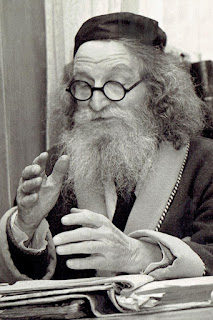by Rav Eitan Shandorfy, yeshiva.co, translated by Hillel Fendel
Many of the classic Torah commentators wrote introductions to their commentaries. Some, such as the Ibn Ezra, wrote a general introduction, while others, such as the Ramban (Nachmanides), wrote a separate introduction for each of the Five Books of the Torah. Our leading commentator of all time, Rashi, did not write an introduction at all - but from what he wrote on the first verse of each and every Book, we can see a common theme: Israel's importance, virtue, honor, and affection in G-d's eyes.
On the very first verse in the Torah, Rashi begins by citing what became a famous question posed by a certain R. Yitzchak: "Why did the Torah begin with the story of Creation, and not with the first commandment issued to Israel?" Rashi then answers as follows:
"It is because of [Psalms 111,6, which states:] “The strength of His works He declared to His people, that He might give them the heritage of the nations.” For if the peoples of the world say to Israel, 'You are thieves in having conquered the lands of the seven nations of Canaan,' Israel can reply to them, 'All the earth belongs to G-d; He created it and gave it to whom He pleased…'" (based on Yalkut Shimoni 187).
We generally emphasize the importance that this first Rashi ascribes to the connection between the People and Land of Israel. But we should also note that the main point is the defense of Israel's honor, and a justification of Israel's basic stance against the lies of the nations. As Rabbi Chaim Dov Chavel wrote in his annotated edition of Rashi's commentary: "I cannot but note how strongly this reflects the purity of the soul of our Rabbi [Rashi], for out of the dozens of teachings in the Medrashim with which he could have begun his commentary, he chose one whose purpose is to defend the honor of Israel."
Rashi further wrote on the first verse that the word B'reshit, which we understand to mean "in the beginning," can also be understood to mean, "For the first." Given that Israel is called the first of G-d's produce (Jeremiah 2,3), Rashi tells us that the first verse indicates that the world was essentially created for Israel: "The heavens and earth were created for the first – namely, Israel."
Rashi's very first words of commentary on the Torah thus teach us the importance of safeguarding the honor of Israel, and his next words teach us the importance of Israel in general, for whom the world was created.
We see something similar in the first verse of the Book of Sh'mot, which begins with a list of the names of the sons of Yaakov who had descended to Egypt. Rashi there states:
"Even though G-d already listed them by name during their lifetimes [towards the end of the Book of B'reshit], He counted them again here after their deaths, in order to show His affection for them; they are likened to the stars, which G- d brings out and in by number and name, as is written, 'He brings out their host by number, He calls them all by name' (Isaiah 40,26) (Medrash Sh'mot Rabbah 1,3)."
Rashi here teaches the great love G-d has for Israel, that He counts and lists them again and again, just as one does with something that he loves. Here, of course, the verses list only the Twelve Tribes, but in Chapter 4, we see that this is true for all of Israel.
On the first verse of the Book of Vayikra, which tells us that G- d first called to Moshe before actually speaking to him, Rashi writes:
"All oral communications by G-d [to Moshe] … were preceded by a call; this is a way of expressing affection, the manner in which the ministering angels address each other, as is written (Isaiah 6,3) “And each one called unto another [and said, Holy, holy, holy is the Lord of hosts].” But to the prophets of the nations, G-d revealed himself in a language of happenstance and uncleanness, as is written regarding Bil'am (Numbers 23,4)."
It might be thought that Rashi here is speaking only of G-d's affection for Moshe Rabbeinu as opposed to the evil Bil'am. However, if we carefully analyze Rashi's words, we see that he did not write that G-d appeared to Bil'am with words of happenstance and uncleanness, but rather that He appeared "to the prophets of the nations." We see from Rashi that G-d's affection is not just for Moshe and because of his greatness, but because of Israel's virtues as a nation.
Rashi repeats this emphasis yet a second time at the end of his commentary to this verse. He writes that G-d tells Moshe that when he speaks to Israel, he should make sure that they understand that G-d is speaking to Moshe only on behalf of Israel. That is, Moshe's greatness stems from the strength of Israel's greatness.
We move now to the first verse in Numbers: "G-d spoke to Moshe in the Sinai Desert… on the first day of the second month…" This verse introduces one of the official censuses taken of Israel, and Rashi writes:
"Because of His affection for Israel, He counts them all the time: He counted them when they left Egypt, and He counted them when they stumbled with the Golden Calf to know how many remained, and He counted them [here, just a month after] bringing His presence [in the Tabernacle] upon them."
Rashi seems to be simply repeating what he wrote on the first verse of Sh'mot. Why would he say the same thing twice?
The answer is that Rashi here tells us something new. In Sh'mot, the Torah shows G-d's affection for the Twelve Tribes, who are mentioned individually by name. But here, the affection is shown for the entire nation!
And finally, we turn to Rashi on the first verse of the Book of D'varim, which states: "These are the words that Moshe spoke to all of Israel on the other side of the Jordan, in the wilderness, in the Aravah near Suf, between Paran and Tophel, Lavan, Hazerot, and Di-Zahav." Rashi writes that these place-names allude to places where Israel sinned:
"These are words of reproof, and the Torah enumerates here all the places where they provoked G-d's anger, therefore it mentions these places only by allusion and not directly - out of regard for Israel's honor."
These words are reminiscent of what Rashi wrote on the first verse of B'reshit, regarding the safeguarding of Israel's honor. But in truth there is a big difference between the two. In B'reshit, the "honor of Israel" refers to proof of Israel's justness in the face of false accusations by the Gentiles. But here in D'varim, the Torah seeks to defend Israel by concealing their sins. That is, the Torah protects Israel not only when they are falsely accused, but even when they have actually sinned!
We have thus seen from Rashi's commentary to the first verse of each of the Five Book how he always seeks to find Israel's praise: their importance, their virtues, their belovedness to G-d, their honor – and even our duty to avoid discussing Israel's negative points.



.jpg)



